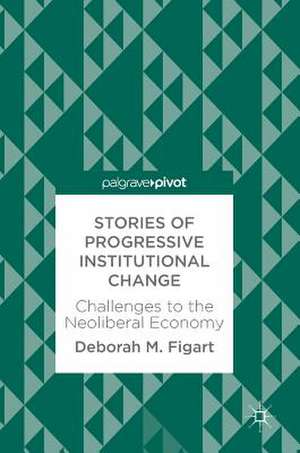Stories of Progressive Institutional Change: Challenges to the Neoliberal Economy
Autor Deborah M. Figarten Limba Engleză Hardback – 10 iul 2017
Preț: 451.10 lei
Nou
Puncte Express: 677
Preț estimativ în valută:
86.32€ • 90.35$ • 71.84£
86.32€ • 90.35$ • 71.84£
Carte tipărită la comandă
Livrare economică 31 martie-14 aprilie
Preluare comenzi: 021 569.72.76
Specificații
ISBN-13: 9783319597782
ISBN-10: 3319597787
Pagini: 136
Ilustrații: XIII, 136 p. 1 illus.
Dimensiuni: 148 x 210 mm
Greutate: 0.34 kg
Ediția:1st ed. 2017
Editura: Springer International Publishing
Colecția Palgrave Macmillan
Locul publicării:Cham, Switzerland
ISBN-10: 3319597787
Pagini: 136
Ilustrații: XIII, 136 p. 1 illus.
Dimensiuni: 148 x 210 mm
Greutate: 0.34 kg
Ediția:1st ed. 2017
Editura: Springer International Publishing
Colecția Palgrave Macmillan
Locul publicării:Cham, Switzerland
Cuprins
1. Introduction to Institutions, Institutional Change, and the Stories.- 2. Accounting for Household Production: Toward an Improved Measure of Macroeconomic Well-Being.- 3. Funding Infrastructure and Local Economic Development: A Public Bank Option.- 4. Contesting the Gig Economy: #SchedulesThatWork.- 5. Delving into the Food Supply Chain: The Case of Fresh Tomatoes.- 6. Doing Business Responsibly: ROC United and Restaurant Workers.- 7. Swimming in Debt: Student Loans and the Fight to Save a Generation.- 8. Transforming Legal Rights and Social Values: Marriage Redefined.- 9. Greening the Economy: Certified Sustainable Coffee.
Notă biografică
Deborah M. Figart is Distinguished Professor of Economics at Stockton University, USA. She is the author of numerous books and articles on subjects related to work and pay. In 2016, she served as President of the Association for Evolutionary Economics, and in 2006 she was President of the Association for Social Economics.
Textul de pe ultima copertă
This Palgrave Pivot presents a series of political economy short stories of collective agency, weaving together the history of a progressive change with a discussion of the role of institutions to effect change. These stories highlight sustained activism around valuing caring, ending discrimination, protecting the environment, improving worker well-being, and reimagining ways to encourage local economic development by restoring public-private social balance. Ultimately, these stories demonstrate that challenges to the neoliberal economy are possible. Neoliberalism can be viewed as a value structure that is undermining sustainable human development by elevating the level of risk experienced in daily economic life. Its hallmarks are globalization, market liberalization, deregulation, financialization, cutbacks in social provisioning through the public sector, and restructuring of labor markets in ways that increase instability. Social movements have responded, agitating for change. The stories here provide examples of how social actors engage in collective behavior to advance the objectives of economic justice, democratic participation in economic life, and human development.
Caracteristici
Focuses on opportunities for agency Demonstrates successful challenges to the neoliberal economy Provides eight stories with "happy," evolving endings Includes supplementary material: sn.pub/extras
